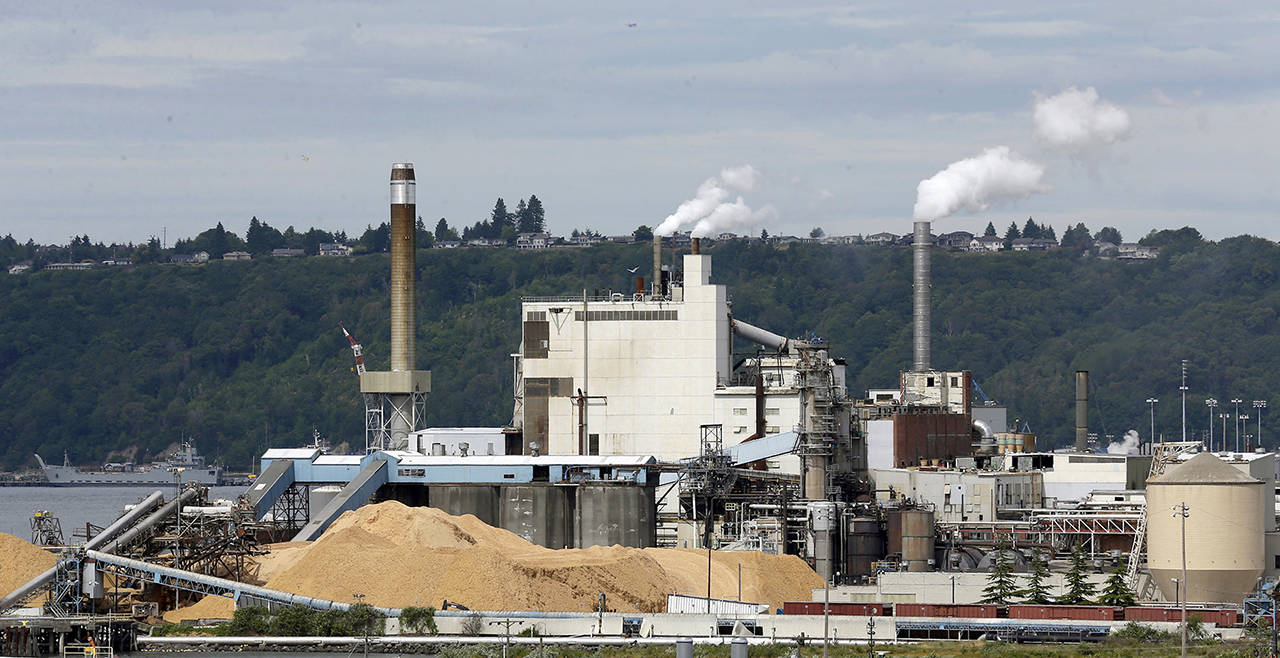By Gene Johnson / Associated Press
OLYMPIA — The state Supreme Court on Thursday reinstated a severely limited version of Gov. Jay Inslee’s plan to cap carbon pollution in the state, a decision the Democrat described as a “clarion call” that lawmakers must act on climate change.
In a 5-4 ruling, the court said the Department of Ecology exceeded its authority when it applied the Clean Air Rule to companies that sell or distribute petroleum or natural gas because they don’t make their own emissions — other people burn the fuel they provide. The state agency only has the authority to regulate “actual emitters” such as refineries and power plants, the court said.
While environmental groups said it is a good step to require those big polluters to cut their emissions, cars remain the biggest source of greenhouse gas pollution. About three-quarters of the emissions that would have been covered by the rule came indirectly from petroleum and natural gas importers and sellers.
That means the court’s decision left the state with a much-diminished rule.
“This ruling will significantly affect our ability to reduce emissions,” Inslee told reporters at a news conference. “This decision has made it even more abundantly clear that we need to take action in the Legislature. The reason is it has disabled one tool that has been used in our toolbox.”
A Thurston County Superior Court judge struck down the rule after it was challenged by industry groups. The four justices in the minority would have reinstated it in entirety.
“The issue is not whether man-made climate change is real — it is,” Justice Debra Stephens wrote for the majority. “Nor is the issue whether dramatic steps are needed to curb the worst effects of climate change — they are. Instead, this case asks whether the Washington Clean Air Act grants Ecology the broad authority to establish and enforce greenhouse gas emission standards for businesses and utilities that do not directly emit greenhouse gases, but whose products ultimately do.”
Ecology has no such authority, Stephens wrote.
After the Legislature failed to adopt a cap-and-trade program, Inslee directed Ecology in 2015 to use authority under the 1967 Clean Air Act to limit carbon emissions from Washington’s largest sources. He called climate change a threat to the state and said the new regulations would help Washington meet its requirements to reduce carbon emissions.
Inslee has long touted environmental issues and made climate change the core issue of his fleeting presidential campaign last year.
He said his office is reviewing the opinion and considering next steps.
For now, an emissions cap is on hold. Another round of rule-making would be required before the agency could impose a cap on stationary emitters. One option could be asking lawmakers to expand Ecology’s authority so it can regulate those “indirect emitters.”
“I think that is very much a possibility,” said Rep. Joe Fitzgibbon, D-West Seattle, chairman of the House Environment and Energy Committee. “Whether or not that is the path we’ll take, I don’t know yet.”
The chairman of the Senate Environment, Energy and Technology Committee Sen. Reuven Carlyle, D-Seattle said, “This is addressable, fixable and solvable. Nobody is going to back off the fixed emitters.”
Prior to the ruling, Inslee had been pressing lawmakers to enact a clean fuel standard as a means of reducing tailpipe emissions.
Now he’s going to push harder to get it through.
“The need for the clean fuel standard has doubled since last evening,” he told reporters.
Last year the House passed such a bill, but it did not get a vote in the Senate, and it is unclear if there is enough support in the Democratic caucus to pass it.
As written, the Clean Air Rule requires facilities to reduce carbon emissions by an average of 1.7% annually and report those emissions every three years. They also could invest in projects that permanently reduce carbon pollution or buy credits from other companies or carbon markets.
In her dissent, Justice Susan Owens wrote that the Clean Air Act did give the Department of Ecology authority to regulate “indirect emitters.”
“At no point do these provisions state that only entities directly emitting air contaminants may be regulated under the Act,” she wrote.
The Association of Washington Business, which led industry and utilities groups in challenging the rule, did not immediately provide a response to the ruling.
Sen. Doug Ericksen, the Ferndale climate skeptic who serves as the ranking Republican on the Environment, Energy and Technology Committee, called Inslee’s attempt to adopt such a broad rule “a classic example of government arrogance and overreach.”
“This was a victory for the rule of law and for the people of the state of Washington,” Ericksen said in a written statement about Thursday’s ruling. “The Inslee Administration overstepped its authority when it decided to force a ‘cap-and-trade’ program on the state of Washington without a vote of the Legislature.”
Supporters of the rule said exempting fuel importers, sellers and distributors was disappointing.
“It now puts the responsibility back in the Legislature, where we’ve been driving this conversation forward,” said Nick Abraham, spokesman for the Washington Environmental Council, which intervened in the case.
Herald writer Jerry Cornfield contributed to this report.
Talk to us
> Give us your news tips.
> Send us a letter to the editor.
> More Herald contact information.

























